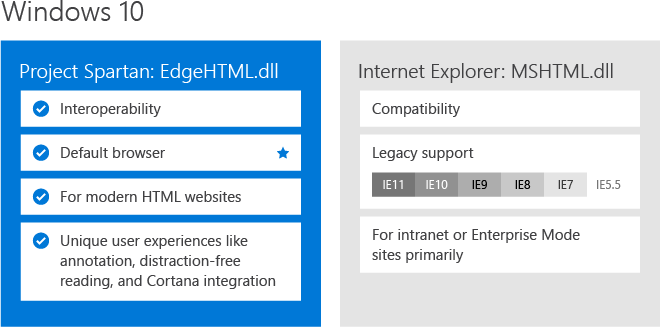With Internet Explorer 11, Microsoft says "Out with the old..."
According to a
MSDN blog posted early this week, Microsoft finally sheds light on the fate of Internet Explorer 11, and the future of Project Spartan.
The company has announced that Microsoft Internet Explorer users will not see future versions beyond 11, and most importantly, Explorer will not be upgraded with the new Edge rendering engine.

“...Hosting our new engine in Internet Explorer 11 has compatibility implications that impact this promise and would have made the browser behave differently on Windows 10...” wrote Project Spartan’s program manager, Kyle Pflug.
Pflug elaborated on the decision of hosting the Edge rendering engine, exclusively, on Spartan, leaving Internet Explorer 11 a legacy browser, citing strong feedback from customers and Insiders.
One reason for not leaving Internet Explorer out of Microsoft Windows 10 altogether, would be older enterprise websites, in order to allow for a softer transition from Windows 7 and 8.1, to Windows 10. However, as newer search ranking standards are introduced, making older websites less relevant and harder to maintain, this transition is not expected to last very long.
One interesting turn regarding the new browser is the chance of Project Spartan finally curbing the trend of using a Microsoft browser merely to download other browsers.
Some of the features that could keep users interested, include the ability to annotate web pages, a special reading mode, allowing for a distraction free experience, and finally, Cortana integration.
One step further, Project Spartan will remain “evergreen”, as Pflug describes it, “with no document modes or compatibility views introduced going forward”.
Compatibility modes were introduced as a way to simulate the way older versions of Internet Explorer rendered web sites, incidentally, one of the biggest hindrances for web developers, forced to implement deprecated code and backward compatibilities. With Microsoft abandoning compatibility modes, developers and users will actually benefit from a greatly improved experience, as the web moves on to the same advanced trends, competing browsers already have embranced.
Microsoft also continues to invite developers to try the new Edge rendering engine, and test their applications, for further feedback and improvements, until Microsoft Windows 10 reaches commercial availability.